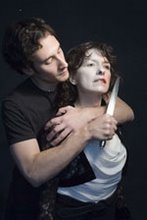Sunday, April 15, 2007
More on the Ghost and Gertred...
... from the point of view of an actor playing the wife/mother in this play:
To go through Gertred's journey with the added element of imagining the spirit of her husband -- the great love of her life, the father of her only son -- always inside her, raises the stakes. The bond is now not merely metaphorical; they are one. The denial of the meaning of her new marriage becomes all the more profound and willful and desperate. When we did this show last July, it was my first stab at the role. I came at it as an outsider with all the usual abstract notions of lust and sex and fallen womanhood. But the more I inhabited the part, the more I felt this sense that, although she is certainly a passionate woman with physical needs, maybe she was unable to let go of the elder Hamlet; maybe she hadn't confronted and grieved his death, to put it in modern terms (the only terms under which I can own and endow the part); maybe she just wanted her family to continue. I felt that, with a little prompting by Claudius who readily understood this circumstance and exploited it fully (though even he -- no mere comicbook villain or plot device -- understands the rankness of his offense, thus also honoring Gertred's character), she was pretending that by marrying her husband's brother she could keep going as though nothing had changed and that her son would in time cooperate with her delusion.
Though this is nothing one can act, Gertred was considered virtuous and honorable and was highly respected among the people. Knowing this does add to the understanding that Gertred is no mere ditz and prohibits any fleeting thought one might have of playing her as anything less than a mature soul and thus robbing the part and the play of its highest potential.
In all, I think the power of her fierce determination to deny her crime (her marriage was considered incest) and to deny the gravity and fallout of what she knows to be ailing her son (though not in the quarto, in the folio: "I doubt it is no other, but the maine, His Fathers death, and our o're-hasty Marriage") are heightened for the audience and for the actor by having both parents reside in the same personage.
... which brings me to the utter devestation/desperation that is the closet scene...
To go through Gertred's journey with the added element of imagining the spirit of her husband -- the great love of her life, the father of her only son -- always inside her, raises the stakes. The bond is now not merely metaphorical; they are one. The denial of the meaning of her new marriage becomes all the more profound and willful and desperate. When we did this show last July, it was my first stab at the role. I came at it as an outsider with all the usual abstract notions of lust and sex and fallen womanhood. But the more I inhabited the part, the more I felt this sense that, although she is certainly a passionate woman with physical needs, maybe she was unable to let go of the elder Hamlet; maybe she hadn't confronted and grieved his death, to put it in modern terms (the only terms under which I can own and endow the part); maybe she just wanted her family to continue. I felt that, with a little prompting by Claudius who readily understood this circumstance and exploited it fully (though even he -- no mere comicbook villain or plot device -- understands the rankness of his offense, thus also honoring Gertred's character), she was pretending that by marrying her husband's brother she could keep going as though nothing had changed and that her son would in time cooperate with her delusion.
Though this is nothing one can act, Gertred was considered virtuous and honorable and was highly respected among the people. Knowing this does add to the understanding that Gertred is no mere ditz and prohibits any fleeting thought one might have of playing her as anything less than a mature soul and thus robbing the part and the play of its highest potential.
In all, I think the power of her fierce determination to deny her crime (her marriage was considered incest) and to deny the gravity and fallout of what she knows to be ailing her son (though not in the quarto, in the folio: "I doubt it is no other, but the maine, His Fathers death, and our o're-hasty Marriage") are heightened for the audience and for the actor by having both parents reside in the same personage.
... which brings me to the utter devestation/desperation that is the closet scene...
Subscribe to:
Post Comments (Atom)



No comments:
Post a Comment